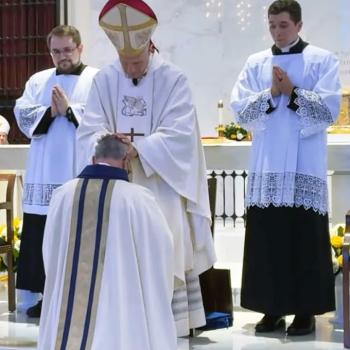In His eternity, beyond time, above
all other comprehension, as it pleased Him,
new loves were born of the Eternal Love.
Nor did He lie asleep before the Word
sounded above these waters; 'before' and 'after'
did not exist until His voice was heard. ~ Dante, Paradiso 29 (translated by John Ciardi)
At the heart of Christian theology is the person of Christ, the man who is the incarnation of God the Son. To encounter Christ is to encounter God, to come face-to-face with God.
Yet the theology of the Trinity does not stop at our profession of faith in the Incarnation. This theology is as broad and expansive as the whole of the created order: it is a theological "theory of everything." For that is precisely what we profess when we say that through him all things were made: all things are an expression of the divine Logos, the word of God that brings everything into existence.
What does this mean? Let me begin with something rather more obvious to anyone who has the ability to ask a question.
My daily life is circumscribed by the work I do in the context of a university. My colleagues and I are dedicated to asking questions about the world, and we have a shared faith (quite distinct from the churches or synagogues or temples we attend or do not attend) that everything in the world ought to be subject to our scrutiny. There is simply nothing we consider out-of-bounds for thinking about.
(A brief aside: the reason I love working at a Catholic university is that it is the place where even our thinking about God is subject to our questioning. Many institutions are positively allergic to the very idea of God.)
The world, in other words, is intelligible: it is a place hospitable for our thinking. Supernovas and strings, social dynamics and economies, developmental disorders and pandemics, Shakespeare and Laozi, political theories and world history—all these objects of study draw together minds dedicated to pushing back the frontiers of our ignorance and placing knowledge at the service of order. In the 5th century B.C., Protagoras may have hinted at the kind of order that human intelligence strove for in his comment that "the human being is the measure of all things." Even as an agnostic, he could see that the world was worth investigating, and that the human being had a unique place in the world. We might say similarly: human intelligence is what measures all things, rendering it knowable—even that which God alone reveals to human intelligence through gracious gift.
Anyone who asks a question is performing the truth of our profession of faith, that God creates the world through the expression of the Logos. For asking a question is an action of meaning-making, a participation in the meaningfulness with which God has wrought everything that is. God "speaks" the world: the first creation story in Genesis points to this idea.
God said, "Let there be light," and there was light. (1:3)
Then God said, "Let the water under the sky be gathered into a single basin, so that the dry land may appear." And so it happened...." (1:9)
Then God said, "Let the earth bring forth vegetation: every kind of plant that bears seed and every kind of fruit tree on earth that bears fruit with its seed in it." And so it happened.... (1:11)
Echoing this language, John the Evangelist describes the role of the Son in the creation of the world:
In the beginning was the Word (Logos), and the Word was with God, and the Word was God. He was in the beginning with God. All things came to be through him, and without him nothing came to be. (1:1-3)
Without him nothing came to be. There is no corner of creation from which the Logos is absent. God is to be found everywhere. The corollary to this truth is that there is no "other" place where God is to be found—God is right here, right now, always.
In this Lenten season, this is worth meditating on. The question is never about God's absence; God can never be absent from the world any more than an artist can be absent from her painting. No: the more difficult question is what God is doing when he feels absent to us—or rather when we absent ourselves from him. God made every part of us, including the parts that discern God's presence and lament God's absence. And the central mystery of the cross reminds us that sometimes the fullness of God's presence might be in the midst of the most profound feelings of God's absence.
Entering into contemplation of this mystery during these forty days, participating in Christ's experience of absence from God, may draw us, like him through whom all things were made, into deeper understanding of the One who breathes forth the cosmos, and gives to us the ability to ask questions about it.
12/2/2022 9:05:40 PM





